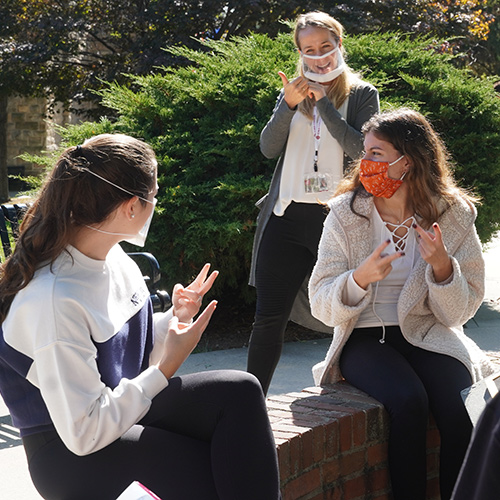The United States Department of Education has awarded a $1.25 million grant to Iona College in New Rochelle to train 40 early intervention specialists to work with deaf and hard of hearing children over the next five years.
With input from the deaf community, Iona faculty in the Education and Communication Sciences & Disorders departments have created an Interdisciplinary Advanced Certificate in Deafness to equip graduate students with the needed skills. The new certificate program is unique in the metro area.
“When a family finds out that they have a deaf child, they are referred to early intervention providers. Those professionals may not have any experience with deaf or hard of hearing children,” said Amanda Howerton-Fox, who with Michelle Veyvoda designed the certificate program and applied for the grant, which will support 40 Iona graduate students over the next five years starting in July 2022. Each year, four graduate students from the Communications Sciences & Disorders program and four graduate students from the Special Education program will enroll in the certificate program, which lasts two summers and an academic year.
Most of the grant funds will go toward scholarships to encourage enrollment in the certificate program. After the graduate students receive their certificates and master’s degrees, they must work with deaf children for two years or repay the scholarships. The program will be fully financed with federal funding through the U.S. Department of Education.
One reason there is a scarcity of early childhood specialists to work with deaf and hard of hearing children is that deafness is a low-incidence disability.
“This certificate program is a good example of something that really needs government support, because while there are relatively few deaf and hard of hearing children, those who do not have access to high-quality specialists may experience profound linguistic, social and cognitive delays due to lack of language access,” Veyvoda said. “These children deserve professionals who are specifically trained to work with them and their families.”
Howerton-Fox’s work, “Deaf Children as ‘English Learners’: The Psycholinguistic Turn in Deaf Education,” published in the journal Education Sciences in 2019, inspired some of President Joe Biden’s federal disability policy.
Quoting the paper, the Biden campaign noted that “language deprivation for children who are deaf or hard of hearing in the early years of life can have a lasting impact on a child’s language and cognitive skills.” Biden’s platform stated that his federal policy would “provide parents, health care providers and early childhood professionals the resources needed to support these children.”
Howerton-Fox stressed the importance of intervention at the earliest ages for deaf children.
“Deafness is one of very few disabilities that can cut you off from language completely and the people around you won’t realize that it’s happening or know the effects of it until you are older,” Howerton-Fox said. “So, it’s important to have specialists who understand the effects of language deprivation.”
For more, visit iona.edu.


